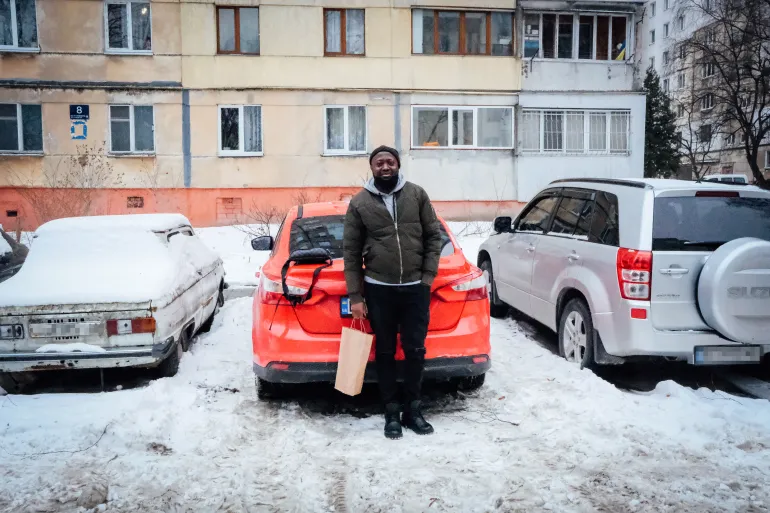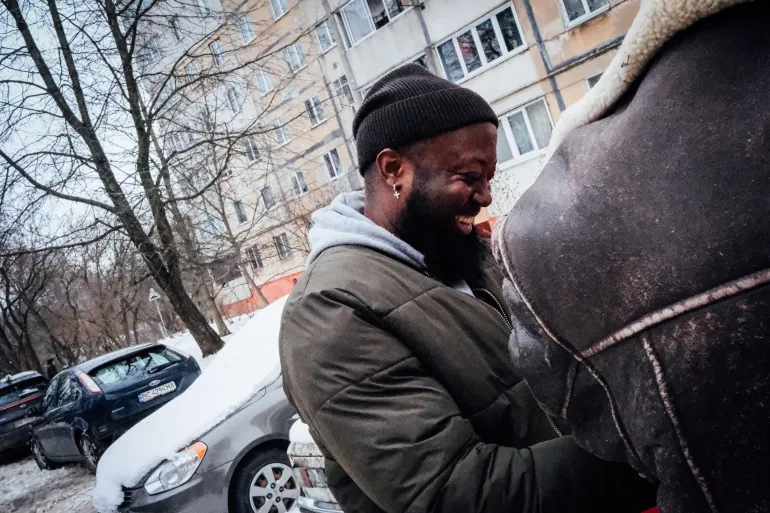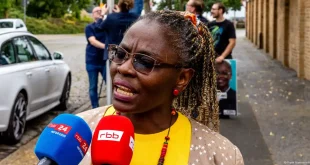AL JAZEERA | Despite the war in Ukraine, for Nelly Nelson, 29, Lviv represents his second home and a place where people ‘enjoy life’.
Lviv, Ukraine – Nelly Nelson, a Cameroonian entrepreneur and English teacher, had not wanted to leave his adopted hometown of Lviv in western Ukraine when Russia launched its full-scale invasion of the country in February last year.
“I was not that scared,” the 29-year-old recalls. “Where I am from, there is an expression: don’t run from what you don’t know.”
Nelson, who was born and raised in the city of Buea, in southwest Cameroon, first came to Ukraine in late 2018 to visit his older sister who was studying at a medical university in Kharkiv, Ukraine’s second-largest city in the northeast of the country. He initially found it “cold and bleak”, but a second visit the following year during the warmer months to Lviv, where his sister had moved for further studies, drastically changed his view of the country. It appeared much friendlier and warmer than on his first visit, and he decided to stay and look for work.
“Lviv is the best city in Ukraine,” he says as he sips on a juice in one of the city’s trendy cafés. His warm, welcoming nature is immediately apparent as he politely places an order from the waitress in Ukrainian. “You can start a conversation with anyone. If you are lost, people will walk you to where you need to go.” He recalls once asking a middle-aged man for directions in Kharkiv. “He just avoided me, so I had to call a taxi.”
In Lviv, Nelson began working as an online English tutor, earning roughly $700 a month, enough to lead a comfortable life. He also rented an apartment – near to his sister, her husband, and his three-year-old niece – from a friendly landlord, Roman, who would become a “father figure” to Nelson.
In January 2022, he met his current girlfriend, a Ukrainian who had grown up near Lviv, on a dating app. Surrounded by people he cared about and with a regular income, he felt settled. He had found his new home.

‘Leave now!’
Then, on February 14, 2022, the US closed its embassy in the capital, Kyiv. Nelson, who had been following the news closely, says he knew “this meant something was going to happen”.
With more than 100,000 Russian troops amassed around Ukraine’s border and talk of a looming invasion, he paid Roman three months’ worth of rent in advance so he and his girlfriend were guaranteed a roof over their heads in the event of war and stocked up on essentials like water and canned food.
Ten days later, on February 24, the invasion began. Throughout the day his sister received a series of anxiety-inducing calls from her friends in Kharkiv. They spoke of terrifying explosions and a mass exodus from the city as Russian troops laid siege to the surrounding areas.
Nelson tried to convince her not to panic. Lviv was only 70km (43 miles) from the Polish border – if Russian troops came to the city, they would simply jump in their cars and drive to the border, he explained.
But later that day, their father called and scolded him for planning to remain in the country. “Are you stupid? Leave now!” he said.
“In our culture, you respect your elders, even if they are a day older. I have three siblings and am the youngest. That was that,” he explains.
Nelson, his girlfriend, and two friends crammed into his red Ford sedan and set off for the border. “I only packed a few things, some clothes, my computer. I knew I would return,” he recalls.
Fifteen kilometres (nine miles) from the border they arrived at the city of Yavoriv, home to a military base that would be destroyed by Russian missiles a few weeks later.
There they met a traffic jam that snaked all the way up to the border and signalled what Nelson describes as “one of the most difficult situations in my life”.
He recalls seeing parents hunched under the weight of enormous bags, their sleep-deprived children walking behind them, while others were carrying elderly relatives on their backs as they passed the seemingly never-ending line of cars. The queue would edge forward a few metres every few minutes. The constant stop-start was exhausting for Nelson who was driving, and they worried they would never reach the border. Some people who had given up hope of reaching the border left their vehicles abandoned by the side of the road.
As he sat in the driver’s seat, Nelson spotted a heavily pregnant woman walking alongside her husband who was struggling to carry two heavy bags and their young son. He sprung out of the car, and told them they had space for the woman. The husband peered into the car. He was reluctant to trust four strangers but eventually warmed to Nelson’s friendly demeanour. The two men exchanged details as Nelson’s partner and the other passengers welcomed their guest into the car.
Finally, after three days in the vehicle, they crossed the border. Their passenger was overjoyed to be reunited with her husband and child who had made it over by foot 24 hours earlier and expressed heartfelt gratitude to Nelson and his friends.
‘What makes your life good?’
Exhausted, the group set off for Krakow, Poland’s picturesque second-largest city, where Nelson’s friend, who was also an English tutor, had a student who had offered them a place to stay.
After staying in Poland for a week, the group decided to move on, travelling through several countries, including Germany and Belgium, before eventually deciding to stop in Basel, Switzerland. Nelson had a friend in the city who could help them settle in. He also wanted to be close to his sister who had moved there from Ukraine as she felt it would be safe for her child.
They spent about a week in a centre for refugees. Nelson describes the place as a “prison”, shaking his head as he recalls the experience. “You had to show ID constantly, before you went out, even when you would have breakfast, lunch or dinner.” He also says there were tensions as Syrian refugees expressed frustration that the “process for Ukrainian refugees was smoother than for other refugees escaping war”.
After more than a week of processing their documents, Nelson and his girlfriend were housed in an apartment and provided roughly $400 dollars per month for expenses.
Although he is grateful for this set-up, he says that it was not enough for life in Switzerland which has one of the most expensive costs of living in Europe. He realised he would need to find another job just to cover basic expenses – his previous income from online tutoring would not be enough if they planned to stay for the long term. So, he applied for jobs for almost two months, using vital savings on expensive internet data, and struggling to adapt to a new, strict system with many jobs requiring a special permit and fluency in German. He barely received a response, leaving him feeling disheartened and dejected. Nelson, who is fluent in French, applied to the State Secretariat for Migration to be transferred to a French-speaking canton but his request was rejected.
One day in late April, he finally snapped.
“There comes a point when you have to think what makes your life good? Is it really just safety? I know people who are in Germany now, they are safe but they are not happy,” he explains.
“In Ukraine, I felt there is more freedom,” he says. “You can work and live more comfortably with your salary. In the rest of Europe, people always struggle with endless taxes, mortgages, internet prices, etc.”
‘Going home’
He spoke to his partner, sister, brother-in-law and niece and explained how he felt and that he wanted to return to Ukraine. Everyone felt the same way. They missed home and work had been difficult to come by. With Lviv remaining relatively safe, they decided together to return home and the five of them set off on the 14-hour drive to the border. On the way, he called Roman and told him he wasn’t happy in Switzerland and would like to extend his rental contract. “No problem, just bring me some Swiss chocolates!” came the reply.
Nelson laughs as he recalls the moment he handed his Cameroonian passport to a stern-faced Ukrainian border guard who, for many stress-filled weeks, had been stamping the passports of foreign residents fleeing the country. Now, faced with a foreign resident voluntarily returning to wartime Ukraine, she did not know how to react.
“She was so confused and asked in English, ‘Where are you going?’” Nelson recalls.
Nelson, who speaks conversational Ukrainian, replied that he was “going home”.
She continued to ask him for more details, until his three-old niece who was standing behind him blurted out “Slava Ukraini”, a national salute once banned in the Soviet Union, which means “Glory to Ukraine”.
The border guard’s expression softened and she began to speak to the young girl in Ukrainian and chat with the family. By the time they crossed back into Ukraine, the guard had exchanged telephone details with Nelson’s sister and invited his niece to meet her daughter.

‘They enjoy life more’
Nelson is now happy to be settled back into life in Ukraine where he has set up a flourishing side business developing websites for an eclectic array of clients, including a falconry business in Dubai.
His experience in Basel has made him appreciate the quality of life he enjoys in Lviv even more.
“Switzerland is not lively,” Nelson reflects. “You have so many rules, you get fines everywhere you park. People just work and sleep. It’s the same routine. Here [in Lviv] people want to have fun, they enjoy life more.”
Nelson says other Africans, many of whom were studying there, are returning to Ukraine.
For now, he is not scared for his family’s safety in Lviv.
“War is just politics,” he says wistfully, citing his home country’s past conflict with Nigeria over the oil-rich Bakassi Peninsula, ceded to Cameroon in 2008, as one example. “I don’t know that much about Ukrainian or Russian history, but I know Russia is trying to take Ukrainian territory. This is very similar to what Nigeria was doing to Cameroon,” he says.
He believes that Russia’s President Vladimir Putin is “too proud” to give up and that the war, and the political deadlock surrounding it, look set to continue for some time. However, he has no intention of leaving his home again. “I just have two countries in my life now. Cameroon and Ukraine,” he says firmly.
 CameroonOnline.org Cameroon news, Actualité Camerounaise, live Web TV & Radio, World News and a lot more
CameroonOnline.org Cameroon news, Actualité Camerounaise, live Web TV & Radio, World News and a lot more


Hère WE go with another culturally uprooted doom sanctioned by his slave name.
Everything you say in this forum shows you have the mentatlity of a man tight in bondage
Bah acho jr,,,,is it la republic bondage or ambazonian bondage?kikikiki
Bah, his son will grow up to be a great footballer who will play for the coach philosopher of the tamable cats of biyameroon. kikikikikikikiki
Brothajoe,,,,,,,kikikikiki
Mr Nelson,what war are you talking between Nigeria & Cameroon? there is no war between Nigeria & Cameroon, the is an ongoing war since 2017 declared by the french cameroon government against the English speaking minority in the SW & NW regions of cameroon. These indigenous people are fighting the french cameroon BIR for a sovereign, Independence country called Ambazonia from the majority french cameroon republic. These war is creating refugee crisis, displacement of people in these two regions,insecuritie, fighting between the cameroon military and Indigenous English separatists,this is how Mr Nelson finds himself in Ukraine.
White,why dont you fight to defend your own language but that of rapist britain?indigenous english?so there are now indegenous french and english on african soil?